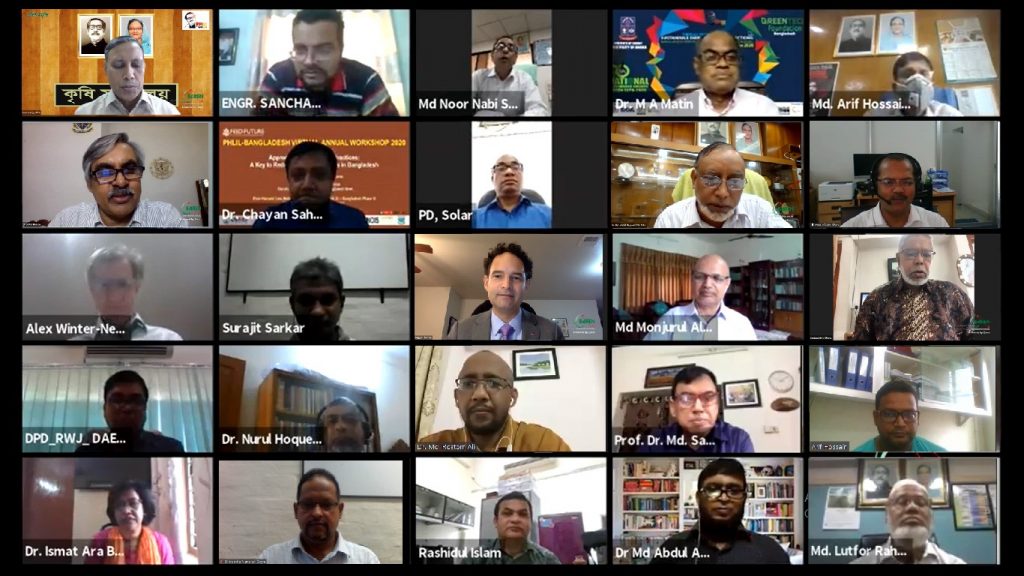On- and Off-Farm Mechanization in Bangladesh: A Sustainable Approach to Ensure Food Security
By Dr. Chayan Kumer Saha, cksaha(at)bau.edu.bd
Bangladesh is the third-largest producer of paddy in the world. Agriculture contributes 13.46% of Bangladesh’s total gross domestic product (GDP). The amount of rice produced is sufficient to feed our 170 million people. Development of high-yielding varieties, subsidies on fertilizers, proper irrigation management and introduction of two- and four-wheel tractors in Bangladesh have safeguarded our crop production. However, the agricultural land is decreasing by 0.5% per year (FAO, 2014) due to urbanization and industrial sector growth. On-farm labor employment was about 43% of the rural labor force in 2017, and is expected to be reduced to about 36% by 2020 and 20% by 2030 (FAOSTAT, 2017). Paddy production has become expensive for farmers, compared to the price of paddy due to labor crisis and the high price of labor, especially during seed planting or transplanting and harvesting, since other operations of paddy production are mostly mechanized. On the other hand, traditional means of post-harvest practices in paddy are also leading to post-harvest losses of paddy at around 14% at the farm level. It will be really challenging to feed the whole nation in the future if we cannot intensify crop production and find the smart ways of handling these issues.
Two USAID-funded research projects, Appropriate Scale Mechanization Innovation Hub (ASMIH)-Bangladesh and Post-Harvest Loss Reduction Innovation Lab (PHLIL)-Bangladesh, led by Dr. Md. Monjurul Alam, Department of Farm Power and Machinery, Bangladesh Agricultural University, Mymensingh (BAU), in collaboration with Kansas State University and the University of Illinois at Urbana-Champaign, have developed complete solutions for on- and off-farm mechanization by addressing challenges in paddy production and reducing post-harvest loss in Bangladesh. The projects also work on women empowerment, youth agro-entrepreneurship development and capacity building of local service providers, operators, mechanics and farmers. The ADM Institute for the Prevention of Postharvest Loss is also a key partner in these projects.
Virtual workshops in September allowed BAU project leaders to update government officials and other interested parties about the progress of the PHLIL-BD and ASMIH-BD projects.
In addition to representatives from Bangladesh and U.S. university partners, the PHLIL-BD workshop included a panel discussion with local project partners from the Department of Agricultural Extension (DAE), Bangladesh Agricultural Development Corporation (BADC), Rural Development Academy, and ACI Motors Ltd. The ADMIH-BD workshop panel included officials from the BAU, the Bangladesh Agricultural Research Council, the DAE, and ACI Agribusiness.
At the workshops, Professor Alam showed how BAU worked in collaboration with research institutes (BARI), public (DAE, BADC, etc.) and private sector partners (ACI Motors and the Metal Pvt. Ltd. etc.) to help identify and disseminate appropriate seed planting, transplanting, harvesting and drying machines, as well as appropriate seed storage technologies for Bangladesh. BAU’s research with ASMIH-BD and PHLIL-BD has shown that the intervention of seed planters, transplanters, and harvesting machines could reduce the cost of each operation by at least 50%, depending on the technologies. At the same time, the machines facilitate more efficient time management and increase the cropping intensity. Additionally, research findings show that combine harvesters (reaping to threshing), BAU-STR dryers and hermetic storage technologies can prevent losses up to 4.74%, 2%, and 5%, respectively. Therefore, if we can reduce loss from 14% to at least 5% using these appropriate machines or technologies, we can save 0.32 million tons of paddy which will enhance our national food security.
Honorable Minister, Ministry of Agriculture Dr. Muhammad Abdur Razzaque, MP, Government of the People’s Republic of Bangladesh, congratulated the USAID Feed the Future program, U.S. universities, Professor Alam, and his team for implementing such innovative and timely projects. After attending BAU’s virtual ASMIH-BD workshop, he said, “In our future development program, we have included two objectives with special priority (i) to ensure nutritious and safe food, (ii) modernization of agriculture through mechanization, agro-processing, value addition and commercialization.”
Similarly, at the PHLIL-BD virtual workshop, Mr. Md. Nasiruzzaman, Secretary, Ministry of Agriculture, Bangladesh, mentioned that, “Application of appropriate agricultural machinery in Bangladesh is urgently necessary in all stages of agricultural activities.” His views are reflected in the recently formulated National Agricultural Mechanization Policy, to which Professor Alam was one of the contributing members. In addition, the Government of the People’s Republic of Bangladesh has approved a mega project worth about 360 million USD for popularizing appropriate agricultural machinery where transplanting, conservation machinery, harvesting and drying machineries will be disseminated to the farmers on subsidy along with other need-based agricultural machines. The government is also giving 70% subsidy on the machines in haor (low-lying areas) and coastal areas, and 50% to farmers in other areas of Bangladesh. Such government-led efforts will help Bangladesh attain food security through mechanization. Appropriate transplanting, harvesting, CA machines, BAU-STR dryer, and hermetic storage technologies as identified by the two projects can be efficient and accessible on- and off-farm solutions for the farmers in Bangladesh. Introduction of appropriate machines together with universities, research institutes, public and private sector partners, along with the government’s policy support will bring smiles to the millions of farmers by reducing production cost, time and loss, and help to attain sustainable food security in Bangladesh.
Dr. Chayan Kumer Saha is a professor at Bangladesh Agricultural University. He is the Principal Investigator, drying component, Innovation Lab for the Reduction of Post-Harvest Loss (PHLIL) – Bangladesh, and Associate Director, Appropriate Scale Mechanization Innovation Hub (ASMIH)-Bangladesh
